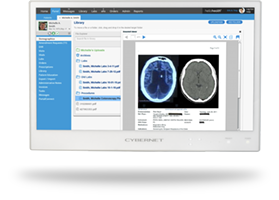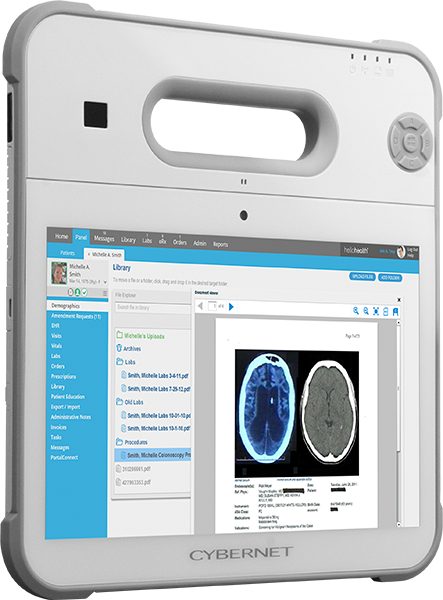The usage of artificial intelligence in healthcare is currently the defining question in the industry. How can it be used? Who should control it? How do we make it more accessible for both patients and providers?
While still being perfected, AI in healthcare can potentially revolutionize several fields, from diagnostics to documentation and even inside the operating room.
What is Artificial Intelligence?
Artificial intelligence (AI) is the field of creating computers capable of thinking like humans can. While AI has been a topic of discussion in both fiction and real-world computer science for decades, the latest innovations in the field center on machine learning and generative AI.
Generative AI does not just predict outcomes based on the data it is given but can create entirely new data and insights. This makes AI programs extremely useful for any role that needs to create new plans or strategies, such as healthcare providers developing new treatments for patients.
Applications of AI in Healthcare
Given its power and flexibility, AI is being explored for multiple different roles in the healthcare sector. Some of the most impactful applications for AI include:
Documentation
Every step of healthcare is accompanied by paperwork and documentation. Providers must write down exhaustive amounts of information concerning the patient’s condition and treatment, taking up so much time that it often spills over from work and into their personal lives. In fact, the average provider spends 15 hours of “pajama time” every week just filling out paperwork.
Understandably, many providers hope that AI can take over note-taking and form-filling responsibilities, letting them focus on the patient and their treatment. Generative AI capable of voice recognition can listen to the conversation between provider and patient, automatically taking SOAP (Subjective, Objective, Assessment, and Plan) notes as they go.
Generative AI can also transfer these notes into standardized formats such as SNOMED CT (Systematized Nomenclature of Medicine - Clinical Terms), further reducing bureaucratic workloads.
Drug Development
Developing new pharmaceutical drugs can take years and cost billions of dollars. Generative AI is currently being explored as a way to speed up this process and reduce costs. For example, generative AI can be used in molecule generation, where the AI simulates molecular structures and how they interact with the human body. This lets researchers explore potential medicines without requiring human trials.
Another application for AI in drug development is the creation of precision drugs. These are drugs tailor-made for a specific patient and their condition and can deliver better results with fewer side effects. Historically, creating precision drugs has been impractical, given the amount of work per patient to create them. However, AI can gather data from multiple sources, such as patient data, genetic information, and biobank studies, accelerating the process and making precision drugs a viable treatment method.
Diagnostic Imaging
One of the most critical steps to treating a patient is identifying what’s wrong with them in the first place. By training AI models on the visual symptoms of a disease, those models can then help identify them in real-life patients.
A real-world use case is in endoscopies and identifying potentially cancerous lesions. Colorectal cancer is one of the most common types of cancer in the world and the cause of over 50,000 deaths per year. Colonoscopies can help prevent colorectal cancer by identifying lesions in the patient’s colon, but spotting them can be challenging even for experienced endoscopists.
AI can be trained to identify lesions by reviewing thousands upon thousands of images of confirmed lesions, more than a single person will ever see in their lifetime. This lets the AI identify and highlight lesions on the screen of a medical panel PC during a colonoscopy, ensuring that providers don’t miss a potentially dangerous tumor. Similar techniques can be used for other diagnostic imaging techniques, such as X-rays, MRIs, and CT scans.
AI-Assisted Surgery
Another use case for AI in healthcare is as an aide during surgery. By reviewing thousands, even millions of hours of surgery videos, an AI can predict the next 15 to 30 seconds of an operation, guiding surgeons step by step through a procedure. This helps ensure they stay on track and don’t accidentally skip a step.
AI can also perform basic tasks via robotic surgery assistants, such as closing port sites or tying off sutures. This lets human surgeons focus on more demanding steps. Real-time AI image enhancement also makes it easier to identify anatomical elements, such as the tumors and lesions mentioned previously.
Benefits of AI in Healthcare
By integrating AI into their workflows, healthcare providers can enjoy numerous advantages, with the greatest being:
Time Savings
With the world’s population continuing to grow and with more people than ever dealing with chronic health issues, the healthcare system has never been more pressed for time. By using AI to handle time-consuming tasks like filling out paperwork, providers can focus on more pressing issues that require their attention and treat more patients in the time that they have. This also means patients have to spend less time waiting for treatment, which prevents the health issues they’re dealing with from escalating.
Greater Accuracy
In healthcare, every little detail matters. A misdiagnosis or failure to spot cancerous tissue can have serious, even lethal, consequences for patients. Artificial intelligence, however, never gets distracted or bored and can pull on data sets larger than a human mind can handle. This lets AI spot symptoms or details that a human provider might miss, ensuring that patients get exactly the treatment they need.
Personalized Treatment Plans
With more time to spend on treating patients and more insight into their conditions, providers can develop more personalized treatment plans tailored to the patient’s specific needs. By finding the perfect fit in terms of medication and surgical procedures, providers can reduce negative side effects and lower recovery time.
Challenges to Using AI in Healthcare
Like any new piece of technology, artificial intelligence does come with certain considerations that need to be addressed.
Specialized Technology
Running AI programs requires dedicated hardware and software to support it. A typical consumer-grade computer simply does not have the processing power to support an AI’s efforts. A dedicated medical AI box PC has the specialized components needed to enable the advanced calculations that AI performs.
Cost
Any new tool, no matter how complex or simple it may be, has a price tag attached. Advanced computers can be especially expensive. To help reduce costs and still get the performance that you need, working with an original equipment manufacturer (OEM) is ideal. An OEM can customize your device, letting you strike a balance between your performance requirements and your budget.
Security
Like with any healthcare device that handles large amounts of private health information, cybersecurity is a top priority for AI computers. This is especially true considering healthcare continues to be one of the most targeted sectors in terms of cyberattacks. Built-in data encryption and access control methods should be considered mandatory requirements for any and all medical computers, especially those supporting AI programs.
AI-Capable Medical Computers from Cybernet Manufacturing
While still in its nascency, the implementation of AI in healthcare promises to be the next great step for the sector. Of course, taking advantage of this new technology will require powerful and reliable computers to support AI’s intensive processing.
If your healthcare group or hospital is interested in AI-capable computers, contact the team at Cybernet Manufacturing. We’d be more than happy to explore how our products can support your AI integration efforts. We can even customize computers to fit your precise needs.


